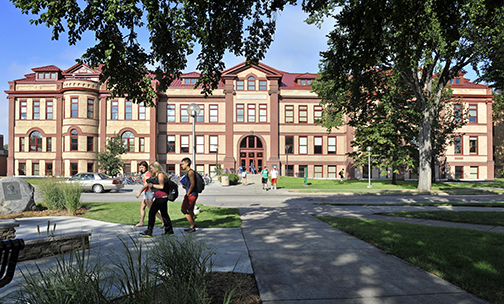Rhetoric, Writing and Culture
To be admitted with full status to the program, the applicant must fulfill all of the requirements set out below.
- In most cases, applicants are expected to have completed a Master of Arts or Science, but exceptional candidates may be admitted directly out of the Bachelor's degree
- Have completed a BA, BS, MA, or MS from an accredited educational institution.
- Have a minimum cumulative grade point average (GPA) of 3.5.
Conditional admission may be granted to students who do not meet all requirements for admission or have deficiencies in prerequisite course work, but demonstrate potential for graduate study. Such students may be required to take additional courses to address deficiencies in prerequisite course work.
In addition to the Graduate School required materials, applications must include:
- an academic writing sample, not to exceed 20 pages, that reflects the student's academic or professional interests and that demonstrates the student's critical and analytical abilities
- A statement of purpose that includes the following:
- coursework you plan to complete in the program
- faculty members with whom you wish to study
- research you plan to pursue
- a sense of what you hope to do once you have completed a Ph.D. degree in English
- how your education and/or life experience have prepared you for graduate work
- official transcripts from all previous undergraduate and graduate institutions
- a letter stating your interest in and qualifications for a teaching assistantship.
Preferred additional materials:
- Practical and / or Professional writing sample not to exceed 10 pages
Financial Assistance
Teaching assistantships are available and awarded based on the applicant's scholastic record and letters of recommendation. Students need to apply to the Graduate School to be considered for admission in the Department of English and before they are eligible for an assistantship. Letters of interest for teaching assistantships, detailing prior experience (if applicable) and qualifications, need to be submitted as part of the application to the program.
Teaching assistantships are reviewed and renewed annually based on academic and professional performance, as well as funding. The annual stipend is $14,000, which is in addition to tuition waivers (including summer) for the duration of the degree program; TAs are responsible for books and fees. In rare cases, teaching fellowships may be granted to advanced doctoral students who have passed their comp exams and completed their course work. Scholarships are available through the Department, the College, the Graduate School, and the University.
The Ph.D. program requires 90 credits beyond the baccalaureate degree and a minimum of 60 graduate credits taken beyond the M.A. and at NDSU.
- Students must take a minimum of 30 credits at the 700- or 800-level.
- English 764: Teaching Strategies is required of all Graduate Teaching Assistants who have not taken a similar class elsewhere.
- Students must take 48 of 60 credits at NDSU from within the Department of English.
- Students with a master’s degree in another discipline may be required to complete additional graduate course work in specific areas of English, as specified by their adviser and supervisory committee.
- No more than 10 credits may be transferred into the program.
Anastassiya Andrianova, Ph.D.
City University of New York, 2011
Field: British Romantic and Victorian Literature, Drama, Translation, Pedagogy, Postcolonial Literature, Slavic Literature, Animal Studies
Lisa R. Arnold, Ph.D.
University of Louisville, 2011
Field: Rhetoric and Composition, Writing Program Administration, History of Writing Instruction
Elizabeth Birmingham, Ph.D.
Iowa State University, 2000
Field: Rhetoric and Professional Communication, Gender Studies, Architectural History, Theory, and Criticism
Kevin Brooks, Ph.D.
Iowa State University, 1997
Field: Rhetoric and Professional Communication, Computers and Composition, Writing Program Administration
Muriel Brown, Ph.D., Emerita
University of Nebraska, 1971
Field: Medieval Literature, Modern Drama, Women's Studies
Sean Burt, Ph.D.
Duke University, 2009
Field: Ancient Jewish Literature, Genre Theory, Ancient Hebrew Poetry, Poetics, Horror Literature & Theory
Gordon Fraser, Ph.D.
University of Connecticut, 2015
Field: Nineteenth-Century and Early American Literature; American Studies; Nationalism and Revolution
Adam Goldwyn, Ph.D.
City University of New York, 2010
Field: Medieval Studies, Medieval Greek World, Influence of Ancient Greek Culture in the Middle Ages
Alison Graham Bertolini, Ph.D.
Louisiana State University, 2009
Field: Contemporary American Literature, Literature of the Southern United States, Women's Literature, Contemporary Ethnic and Postcolonial Literature
Linda L. Helstern, Ph.D., Emerita
Southern Illinois University-Carbondale, 2001
Field: Native American Literature, Modernism, Contemporary Poetry, Literature and the Environment
R.S. Krishnan, Ph.D., Emeritus
University of Nebraska, 1981
Field: Restoration and 18th-Century British Literature, Postmodern Theories, British Novel, Postcolonial Literature
Bruce Maylath, Ph.D.
University of Minnesota, 1994
Field: International Technical Communication, Rhetoric and Composition, Linguistics
Robert O'Connor, Ph.D., Emeritus
Bowling Green State University, 1979
Field: Romantic Literature, Science Fiction and Fantasy
Kelly Sassi, Ph.D.
University of Michigan, Ann Arbor, 2008
Field: English Education, Composition and Rhetoric, Native American Literatures, Culturally Responsive Pedagogy
Dale Sullivan, Ph.D., Emeritus
Rensselaer Polytechnic Institute, 1988
Field: Rhetoric Theory and History, Rhetoric of Science, Rhetoric of Religion, Technical Communication
Amy Rupiper Taggart, Ph.D.
Texas Christian University, 2002
Field: Writing and Rhetoric, Pedagogy, Literacy Studies
Verena Theile, Ph.D.
Washington State University, Pullman, 2006
Field: 16th/17th Century Literature, Shakespeare, Early Modern Drama, European Literature, Literary Theory, Science Fiction and Fantasy, Film and Adaptation Studies
Emily D. Wicktor, Ph.D.
Kansas, 2010
Field: 19th Century British Literature and Culture, particularly Victorian Sexuality and Sexual History; Rhetoric, Composition, and Pedagogy; Literary Theory; Modern British and American Drama; Research Methods and Methodology

